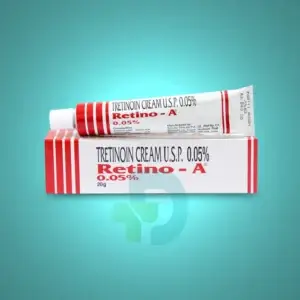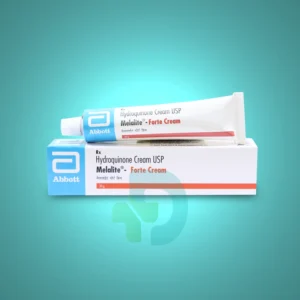Get Tretinoin Cream 0.05 % at your Door & Cut your wait times and Skip the trips to your in-person dermatologist and pharmacist with Dailymedscare
use your Tretinoin Cream correctly is essential for its effectiveness and safety
Tretinoin Cream is ideal for treating various skin conditions, including acne, wrinkles, and age spots. It is a vitamin A derivative and has been proven to be an effective treatment for many skin problems. However, the drug has some side effects and potential drug interactions. Therefore, it’s essential to understand how to use the drug properly and safely before starting any treatment. In this guidepost, let’s discuss dosage, usage, side effects, and drug interactions related to Retin A to help you understand whether or not this medication is proper for you.
What is it?
Tretinoin (also known as all-trans retinoic acid) is the active ingredient in the brand name product Retin-A and many other generic products, used to treat acne.
How to use Retin-A
It would help if you first cleaned your face with a mild soap or cleanser. Rinse your face with warm water and dry thoroughly. Apply a pea-sized amount of Retin-a to the tips of your fingers and massage it gently into your skin. Start with one application per day and increase to two or three applications daily as your skin becomes used to the medication.
It should be applied to the face, avoiding the eye area. If you accidentally get Retin-a in your eyes, rinse immediately with cool water. Allow the medication to dry for 20 to 30 minutes before applying moisturizer or makeup.
Important
The liquid form of tretinoin should be applied only at night, because sunlight causes it to stop working. In most cases, the full benefit of tretinoin does not occur until 4 to 6 weeks of daily use.
Dosage of Retin-A
You can avail of the drug in cream or gel form. It is applied to the skin once or twice a day. The recommended starting dose for acne is 0.025% cream or gel applied once daily. If you are using the 0.1% cream, apply it once daily, preferably in the evening before bed. If you have dry skin, your healthcare provider may recommend using the 0.025% cream every other day or every third day until your skin adjusts to the medication.
For topical applications (cream, gel, or liquid):
Adults: Apply once a day, at bedtime, to the afflicted area(s) of skin. Your doctor will determine the right way to use and dosage for your child.
For fine wrinkles, dark blotches, and rough skin caused by sun exposure:
For topical administration (cream):
Adults under the age of 50 should apply it to the afflicted area(s) of skin once daily, preferably before going to sleep.
Over-50s: Consult your physician for appropriate use and dosing.
Side effects of Retin-a
It is essential to be aware of the potential side effects. The most common side effects include redness, peeling, and skin irritation. These side effects are typically mild and resolve with continued use of the medication. However, more severe side effects can occur. These include burning, stinging, itching, swelling, and skin blistering. If these side effects occur, discontinue the medication and contact your doctor immediately.
Drug interactions with Retin-a
As a form of vitamin A, it decreases the amount of oil produced by the skin. It can interact with other medications, so it is important to tell your doctor about all medications you take, including over-the-counter drugs and supplements. Some everyday drug interactions with Retin-A include:
- Antibiotics:Tetracycline antibiotics can decrease the efficacy of Retin-A . If you are taking an antibiotic, talk to your doctor about whether you should also use Retin-A.
- Birth control pills:Retin-A can make birth control pills less effective. If you are using birth control pills, be sure to use a backup method of contraception while using this drug in the first place.
- Chemotherapy:Vitamin A can increase the side effects of some chemotherapy drugs. If you are undergoing chemotherapy, talk to your doctor about whether or not you should use the drug.
Generally, it is always best to talk to your doctor before starting or stopping any medication. It is imperative if you are on multiple medications, as interactions between drugs can
- Tretinoin advice from a pharmacist Tretinoin may cause severe headaches or dizziness:Avoid driving or using machinery until you know how the medication affects you. Symptoms usually go away within 3 days if they occur (see side effects for details).
- Tretinoin is teratogenic, meaning it can cause birth defects in unborn babies. The medication is also known to cause miscarriages. For this reason, you should not become pregnant while using tretinoin. While taking tretinoin, you should use two forms of birth control in addition to avoiding sexual contact. This includes condoms and another form of chemical birth control (such as an IUD or pills). If both husband and wife are taking the medication, they should use birth control at all times to prevent pregnancy, even if the drug isn’t being used on one spouse’s skin.
- Tretinoin can weaken your skin’s natural ability to protect against sunburn and other damage from the UV rays of the sun. Stay out of the sun, wear protective clothing, and avoid using sun lamps or tanning beds.
- It’s very important to tell your dermatologist or other healthcare providers about all the medications you’re taking, even over-the-counter products like ibuprofen and Tylenol.
- If taken together, over time the two vitamins can build up in your body and become toxic. For this reason, avoid adding vitamin A-containing products to your regimen if you have been using tretinoin for more than 5 days
- Store this medicine away from light because exposure to light diminishes tretinoin potency
FAQs about Tretinoin Cream (Retin-a)
Can Retin-A be used during sun exposure?
It is generally recommended to avoid prolonged sun exposure and wear sunscreen when using Retin-A. Tretinoin can make the skin more sensitive to sunlight, increasing the risk of sunburn and sun damage. Applying sunscreen with a high SPF is important when using Retin-A.
Can Retin-A be used on all skin types?
Retin-A can be used on various skin types, but individuals with dry or sensitive skin may require a more cautious approach. Starting with a lower concentration and gradually increasing the frequency of application can help minimize potential irritation. Consulting with a dermatologist can provide tailored guidance based on your skin type
Can Retin-A be used on sensitive areas of the skin, such as around the eyes?
Retin-A should be used with caution around sensitive areas of the skin, such as the eyes and lips. These areas are more prone to irritation. It is recommended to avoid direct application to these areas or use a lower concentration specifically formulated for sensitive skin.
Can Retin-A be used in the morning instead of at night?
Retin-A is typically recommended for use at night because sunlight can degrade the medication and increase the risk of skin sensitivity. However, in some cases, a dermatologist may recommend using Retin-A in the morning, followed by sunscreen application, if it is better suited for an individual’s routine or skin condition.
Can Retin-A be used on oily or acne-prone skin?
Retin-A is often prescribed for individuals with oily or acne-prone skin. Its exfoliating and pore-clearing properties can help reduce excess oil production and prevent clogged pores. However, it is important to start with a lower concentration and gradually increase as tolerated to avoid excessive dryness or irritation.









Reviews
There are no reviews yet.